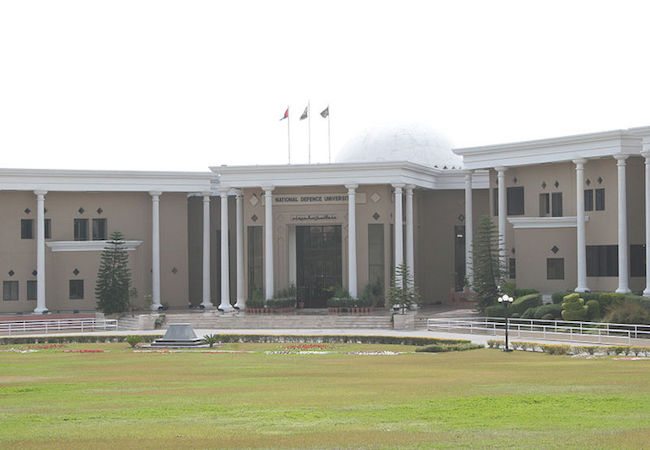
By Pizwak Imtiaz and Nauman Hassan
National Defence University organized a conference in Islamabad on Friday, the 31st of March, titled Islam and Modernity in an Age of Transition. This was an impressive gathering of world-renowned intellectuals and scholars, who continue to grapple with the ever evolving issue of modernity and the future of global religious communities. The commitment of many of these scholars to engage in cutting edge intellectual interventions in contemporary debates is second to none. It is important to mention that all these scholars are based at the most prestigious institutions and universities globally.
NDU’s conference hosted some of the most well-known western scholars on Islam today. The conference comprised of three panel discussions, each trying to situate the debate of Islam and modernity in the context of the changing world order. Prof. John Esposito from Georgetown University delivered the keynote lecture to kick off the day’s panel discussions. He was followed by other leading luminaries such as Dr. Hans Kochler from Austria, one of the leading political philosophers of our times. The keynote speech for the final session was made by Dr. Salman Sayyid, eminent professor at Leeds University.
The conference addressees delved upon concepts such as the relationship between religion and politics, the interfaith encounter, causes of global hegemony and geopolitics. Dominantly held Western narratives were critiqued with respect to the alternative viewpoints, and the construction of counter-hegemonies was analyzed as seen through the rise of the East, and a declining West. The eminent scholars stressed recurrently upon themes of alternative narratives that counter hegemonic imperialist ideologies of the corporate west. In analyzing the emergence of Chinese modernity and its rise as a ‘civilization state’, Dr. Ejaz Akram pressed upon the need to re-easternize, analyzing the commonalities of traditions between Confucius China and Islam. Looking optimistically at the Pakistan-China relationship, he remarked, ‘in our relation with the East, there is no 1492’.
The need for decolonization of the minds as eloquently formulated by Dr. Charles Amjad Ali, Professor Emeritus at the Luther Seminary was seen to be of utmost importance for a way forward for the global south. Scholars reflected upon the detrimental effects of colonialism that among other things imposed a single, unified version of history upon the world, according to which the west was always deemed victorious and civilized. A thought most aptly articulated by Dr. Sayyid,
“A picture held us captive. And we could not get outside it, for it lay in our language and language seemed to repeat it to us inexorably.” Ludwig Wittgenstein
The creation of western hegemony was thence aptly deconstructed. This complex nature of ‘narratives’ and what deems some narratives dominant over others was also examined by the speakers, who questioned among other themes, the idea of the clash of civilizations as a dated, self-serving prophecy forwarded by the unipolar west. In Dr. Hans Kochler’s words,
“Clash of civilization served as a self-fulfilling prophecy and the end of history thesis an illusion created by the west in order to propagate its position as the indispensable nation.”
The current disintegration of the west and the rise of the alt-right as a response to the ‘systematic secularization’ project that excluded value systems was elucidated upon by Dr. Esposito and Dr. Ejaz Akram, who attempted to position Muslims in the current changing world order, and tried to provide narratives that emphasized unity, inclusion and principles of universality common to all traditions. All participants raised the question of finding interfaith similarities and stressed common values of human dignity, justice and peace as grounds for dialogue. Dr. Jasmine Zine from Wilfred Laurier University, Canada, emphasized the need to engage in ‘revolutionary spirituality’ in collaboration with all faith-based scholarsin order to construct an avid response to challenges to the world. Dr. Shabana Mir from the American Islamic College highlighted the need for recognition of diversity both within and beyond Muslim communities, as a step towards the achievement of global justice.
The perils of islamophobia in the west and its formalization as a new idea, emerging in the context of the marginalization of Muslims post-9/11 was dealt with as another theme, particularly in the third session by Dr. Salman Sayyid, Dr. Samina Yasmeen of University of Western Australia and Dr. Zahid Bukhari of Georgetown University. The scholars answered questions regarding the contemporary political scenario in the global world order, and the ways that which Muslims can deal with the rising hatred against their ranks. The need for global concerted efforts that unite and support diversity, inter-faith conversations that aim to bridge gaps and a need for Muslim scholarly agency was stressed as necessary to grapple with the challenges of the modern world.
With a view to criticize the rise of fundamentalism, Dr. Basit Koshul from LUMS quoted Iqbal and Quranic verses to accentuate the need for moderation for Muslims. He critically examined the apparent gap between religion and science, concluding that there is no inherent contradiction between scientific inquiry and faith, each being indispensible to the other. The gaps therefore, were attributed to the extremists on both ends: the enlightenment scientist who attempted to replace religion, and the religious fundamentalists who confine themselves completely to matters of faith.
Through the constructive and critical discussions of the day, the conference managed to forge a new narrative that offers the possibilities of an ‘alternative modernity’ that is grounded far more deeply in achieving truth and justice, for Pakistanis, for the Muslim communities of the world.
Pizwak Imtiaz is a graduate of Central European University, Hungary. Nauman Hassan is an enthusiastic researcher, who has developed his interest in Strategic Studies to become scholar in the fields of Strategy, Security and Defence Studies. Currently, he is serving at National Defence University, Islamabad as a Lecturer (V/F) and Asst. to Academic Advisor. Mr. Hassan has acquired Master degree in Strategic Studies from National Defence University. His area of focus is Asia Pacific studies.




